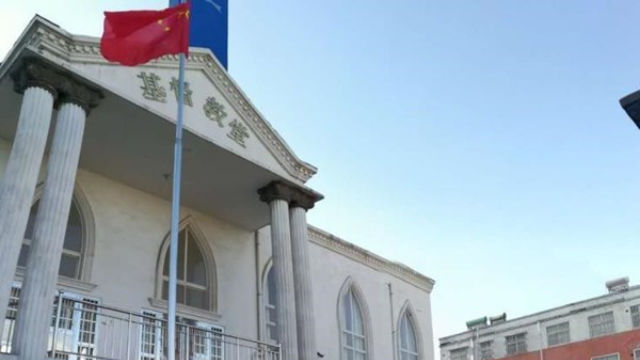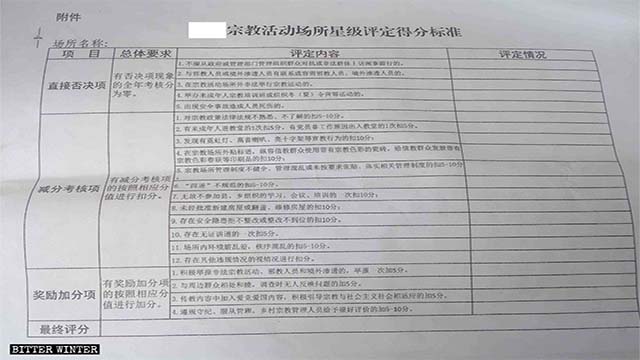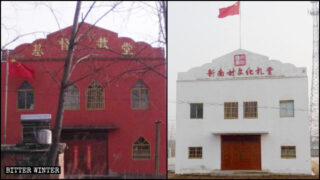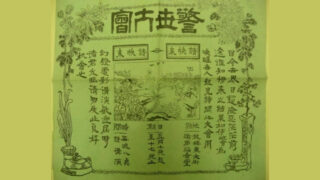A new control measure imposed on the government-approved churches threatens to close down any religious venue that loses points for disobeying the regime.
by Jiang Tao
Since March, all venues that belong to the five authorized religions in China in a county of central China’s Henan Province are rated on a five-star classification system. According to a document issued by the United Front Work Department in the county, entitled Measures for the Star Rating Assessment of Religious Activity Venues, only the places of worship that receive the score of 95 points and above are given five stars. Venues are rated as four-star establishments when they score between 90 and 94 points; three stars are assigned to those that get from 85 to 89 points; two stars are given to those that score 80-84; and one – 75-79.
Those that are assigned scores between 50 and 74 for two consecutive years must cease all activities for one year and undergo “rectification.” Changes should also be made to the composition of the venue’s management committee. This requirement contradicts the set practice of electing committee members by a vote of the congregation; the Two Chinese Christian Councils and the government do not have the right to appoint or dismiss committee members. Religious venues that refuse to undergo “rectification,” or the ones that receive a score lower than 50 points for two consecutive years, will have their venue registration certificate revoked.
The assessments for appointing stars are carried out each quarter, to achieve “dynamic management” of religious venues, the document states. For congregation members, such management, in reality, means “dynamic threat,” since they are under constant pressure to preserve their church.
When are points deducted?
Ten points are deducted if neon lights, loudspeakers, illuminated crosses are discovered in a religious venue, or religious couplets and other materials with religious overtones are distributed to believers. The same amount of points is lost if clergy members do not attend the studies, meetings, or training sessions organized by the government or the Two Chinese Christian Councils without a good reason.
A church will incur a deduction of 5 to 10 points if congregation members are not appropriately familiarized with the government’s religious policies, laws, and regulations. In case a CCP member is found visiting a church for work-unrelated matters, a deduction of 5 points will be applied.
For some “misdeeds,” the total score of a venue could be set to zero, and so-called “direct veto” is imposed. These include: disobeying orders from government institutions; organizing collective resistance to the removal of crosses and other punitive actions by the authorities; communicating with or taking in members of religious groups designated by the government as xie jiao or members of foreign religious groups; operating a Sunday school or organizing winter/summer camps, and alike.
Report on house churches, improve your score
The document lists four cases when places of worship may improve their standing by increasing their total score. The first is: “proactively reporting illegal religious activities, xie jiao members, and foreign infiltration; 5 points will be added per instance reported.” In other words, if some churches face closure, as long as they inform on a functioning house church meeting venue, then they might be able to avoid being shut down. This is in line with the CCP’s policy of inciting conflicts between the Three-Self Church and house churches as well as foreign-related churches.


If a religious venue gets along well with the residents in the neighborhood and no one reports any problems during an investigation, it may be added five points. If a place of worship follows the laws and regulations, has a steady record of obeying orders from the higher-up managing institutions, and is positively assessed by the local authorities in charge of religious affairs, it may be given from 5 to 10 points.
Besides, if a church adds content related to “loving the Party and loving the country” to their preaching and is actively “sinicizing” the church, i.e., “proactively promotes religion to adapt to socialist society,” it can also receive additional 5 points.
Extension of the social credit system?
The scoring system of religious venues seems to be closely associated with the infamous social credit system. Expected to be fully implemented in 2020, the system will track and score all citizens to determine their social standing. This score will decide whether or not one can travel, be promoted at work, buy a car or property; and even what kind of school one’s children can attend. Presented by the government as a tool to create a “culture of integrity” and increase “the level of credibility of the entire society,” the system is, in fact, yet another measure for the regime to monitor and control everyone, at all times.
People of faith and places of worship are already under extensive scrutiny in China. With the social credit and religious venues scoring systems in play, any behavior that is even slightly indicative of going against the regime will be quantified and recorded, ultimately resulting in even officially-approved religious venues being punished and closed down eventually. A plethora of evidence proves that the CCP is utilizing all types of registration and scoring systems to suppress people of faith or dissents by controlling their every move and imposing restrictions on what they are allowed to do, like buy a plane ticket.













